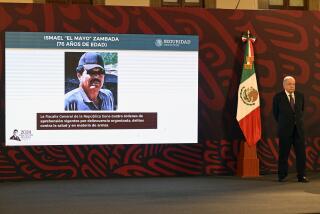U.S. Quietly Helps Panama Organize Intelligence Office : Latin America: The agency reportedly is headed by a former senior official in the Noriega regime. It targets domestic ‘troublemakers.’
- Share via
PANAMA CITY — Panama, a country terrorized for more than 20 years by misuse of government intelligence organizations, has created--with U.S. assistance--a secret intelligence office headed by a onetime senior official in former dictator Manuel A. Noriega’s puppet government, according to Panamanian officials and sources.
Although the Council of Public Security and National Defense, as the new office is called, was authorized by presidential decree in February and has been in operation since July, the existence of its intelligence activities has been kept secret from the public and all but a handful of government officials.
According to one government source, who asked not to be named, a tacit agreement has been reached with key newspaper publishers not to disclose the workings of the agency, which he described as targeting domestic “troublemakers.”
The National Assembly has not been informed about the workings of the agency, and no legislative committee has been organized to oversee its operations, sources said.
The agency director reports only to President Guillermo Endara who, at his discretion, can inform the ministers of government and planning and the foreign minister. Under the decree establishing the council, these are the only officials with direct knowledge of the agency.
The agency employs about 100 agents and operates out of temporary quarters in the rear of the presidential office building while permanent facilities are being constructed across the street. The employees were hired through blind newspaper ads asking for research assistants to work for non-existent private companies.
The whole matter has been so shrouded in secrecy that not even Controller General Ruben Carles, the minister who controls all government spending, knew about the agency until he was questioned by reporters.
Carles, expressing stunned surprise, said: “I don’t know anything, I don’t know what they are doing. I am not paying for anything, and I don’t know where they are getting the money.” He added that any funding has to come from elsewhere.
According to government officials, there are no legislative or other institutional rules governing the behavior of the agency. The head of the council, Menalco Solis, was not confirmed by the legislature and his position is generally hidden. “I thought he was Endara’s legal adviser,” Carles said.
One reason for the mystery could be the vagueness of the agency’s mission. Its aim, one official said, is to gather information on those presenting ideological threats to Panama’s national security, including domestic “troublemakers.” These include opposition figures organizing mass demonstrations, he said.
Another target is the newly organized National Police, which has been formed from remnants of Noriega’s old army. “We’ll watch the police,” the official said. “We can’t let the monster arise again.”
He said the job also includes gathering information about external threats, a perceived danger dismissed as insignificant by U.S. Ambassador Dean R. Hinton in an interview.
Such an agency, although it is under the auspices of an elected president and involves no military or police personnel, is an extremely sensitive subject here because the efforts to keep its activities veiled and the lack of specific restraints bring to mind severe abuses of the intelligence agencies created by Noriega.
The concerns are magnified because Solis, described by one prominent Panamanian as “very scary . . . very dangerous,” twice served as a senior minister in puppet governments established by Noriega.
A law partner of Endara with no background or other past connection with intelligence work, Solis, who was educated in the United States, was named to the job because he “enjoys the confidence of President Endara,” a government official said.
“Solis doesn’t have a good record,” according to one of Panama’s most powerful bankers, referring to Solis’ involvement in the Noriega government and scandals that the banker said have clouded his business and political life.
Among the major mysteries about the agency is the source of its financing. Carles, who has to approve every cent of government spending, said there are no discretionary funds to cover such operations and that they could not be hidden in any other budget item.
One official said that the U.S. Central Intelligence Agency was assisting in personnel training and that he expects that the Panamanian agency will exchange information with the CIA.
When this official was asked if help was coming from a U.S. Justice Department police training mission here, he nodded affirmatively. He added that contacts on behalf of the new intelligence agency had been made with Taiwan and Venezuela.
A Panamanian economist said he had been told by “a credible source” that the “money was coming from the U.S.”
Hinton, who otherwise said he would not comment on any intelligence matters, denied that the Justice Department mission was involved at all with the Solis agency. American military authorities who deal with Panamanian officials also denied any involvement or knowledge of the new intelligence group.
More to Read
Sign up for Essential California
The most important California stories and recommendations in your inbox every morning.
You may occasionally receive promotional content from the Los Angeles Times.













